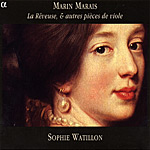Bass viol players Sophie Watillon and Friederike Heumann open this program of selected movements from Marin Marais’ Second through Fifth books with an extract–the final Chaconne from Concert “Le Raportée”, composed by Marais’ mentor M. de Sainte-Colombe. In comparison to Jordi Savall and Weiland Kuijken (Astrée), who improvise yet also are mindful of the regular rhythm of the dance, Watillon’s inordinately broad phrasing combined with a tendency to draw heavily on detail treats the movement less as a dance and more as a loosely structured meditation on it. Sainte-Colombe certainly would have approved of both approaches (especially from such skilled performers), though given the often highly introspective nature of settings such as this and the imaginative spirit the composer was known to cultivate, Watillon and Heumann’s performance seems truer to the master’s ideal.
Throughout this beautifully recorded, lavishly presented, and well-thought-out program Watillon and her expert consort–théorbe, baroque guitar, bass viol, and harpsichord–deliver equally fascinating original performances of many of Marais’ most famous works. For example, Couplets de Folies (or Folies d’Espagne) from Book Two receives one of the most vivacious–and unique–performances on disc, notable for its inclusion of the guitar. Though highly fashionable at the time (even Marais’ benefactor Louis XIV was known to play it), the guitar is rarely used in this setting, one that all but begs for its presence. Following the recent lead of Paolo Pandolfo, Watillon boldly includes two guitars along with théorbe, harpsichord, and a second bass viol. Her performance near the conclusion of the Couplets de Folies is noticeably faster than all five of my reference recordings–Pandolfo (Glossa); Dreyfus (Simax); Bernfeld (Accord); and both of Savall’s (Astrée and AliaVox). The result is absolute fireworks. More than any other performance I’ve heard, Watillon and her ensemble’s often frenzied rendering fully evokes the sultry sounds of castanets and feverish dancing on one level, as well as the resulting folly (hence “Folias”) and insanity on another.
Watillon achieves equally stunning results by including a guitar in Marais’ frequently recorded Muzette from Book Four. In complete contrast to its role in Couplets de Folies however, the guitar’s pensive metronome-like single-string plucks heighten the viols’ weaving ebb and flow with measured beats. Alpha’s richly detailed sound is audiophile quality and the thought-provoking notes are a joy to read. This is a very special recording, recommended to all, but especially to those already familiar with Marais and his circle. [4/14/2004]
































